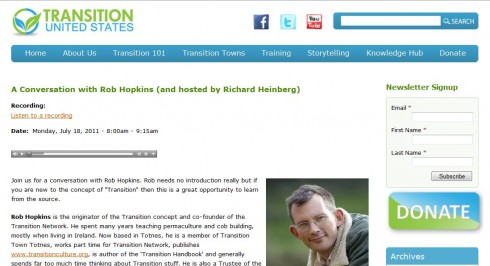19 Jul 2011
Recording of yesterday’s webinar with Transition US
Had a great time yesterday on the webinar call thing to Transition US. It lasted about 75 minutes and we covered lots of things. We’ll be doing it again in September but for now, click here to hear the recording of the event. The very end is especially good, when you can hear lots of the callers saying goodbye… lovely that was… Thanks to everyone who organised it, especially Carl, Carolyne and Richard.

David Eggleton
19 Jul 1:01pm
I especially liked something you said near the end:
“We need everyone on board and everybody playing to their strengths.” One of the ironies of Transition is that it’s permacultural, yet (uncertainly, so that) joiners feel a strong urge to replicate.
I promptly wrote about it at http://transitioninaction.com/group/whole_person_paradigm/forum/topics/we-need-everyone-on-board-and
Paul Handover
19 Jul 2:56pm
Dear Rob, very useful and much material to refer to. Especially loved the quote, “The future is here – it’s just evenly distributed.”
However, one of the aspects about the way things are developing is how to get greater co-ordination from what must be hundreds and hundreds of organisations and blogs joining the theme of building a sustainable future?
Any thoughts?
Best wishes,
Paul (ex resident of Harberton, Devon!)
David Eggleton
19 Jul 4:08pm
Paul,
I believe achieving such co-ordination would be a tremendous and dicey challenge, and would require a great diversion of attention, energy, time and assets we’re advised to invest in local economy development. With all those voices implying many and varied locations, do you firmly believe the benefits outweigh those costs?
Paul Handover
19 Jul 4:44pm
David, I can’t say that I ‘firmly believe’ the benefits because I am speculating about something that doesn’t exist and there’s no way to judge the case, for or against. Your point about a diversion of resources is a valid one.
However, time is not on our side and the more effective the sharing of ideas the greater the chance of the world’s peoples acting effectively in harmony.
Localisation is clearly a sensible ‘bottom-up’ approach to re-engineering communities but does carry, in my view, a serious risk of lots of wheels being reinvented in lots of communities.
Ergo, the most effective way forward may well be some melding of local, national and trans-national visions.
Regards, Paul
David Eggleton
19 Jul 8:20pm
Thank you for that friendliness. Since we have this place to ourselves….
It’s interesting that we are only two, are both friends of Transition, and yet would have quite a lot to work through, if we chose to do so. How much more to process with more people, some of whom are not FOTs.
In the brief reply you wrote, I snagged on six phrases: “time is not on our side,” “the more effective the sharing,” “world’s peoples acting effectively in harmony,” “bottom-up approach to re-engineering,” “risk of lots of wheels being reinvented,” and “most effective way forward.”
To the first, I can only say I don’t yet know what you want to get done in the period you perceive as coming too soon to an end. To the second, third and last, I must say I, too, highly value effectiveness, but that the definition of effective that I’ve learned and use doesn’t work in all the places you put it. To the fourth, I ask why should we have an approach to something to be completed? Why not a living and continuous process? To the fifth, I ask isn’t it desirable to have genius unleashed and proven redundant everywhere? Wouldn’t that be self-reinforcing? When we use wheels and other stuff invented by others, it might be efficient and easing, but often it’s not empowering. I firmly believe that energy descent calls for empowered people synergizing.
Regards also,
David
Paul Handover
19 Jul 9:41pm
Since we have this place to ourselves…. 🙂 We could play for hours!
What a fabulous discourse! Hopefully one that attracts others in due course.
I don’t have decent answers to the questions you raise and I’m very conscious of the risk of it turning into a debate for debate’s sake – something both of us wouldn’t want.
In the end, the world tends to reflect back what we think about most and so long as more and more are thinking that the old ways are broken then positive evolution will bring the change we all hope for.
With regard to the question of time, here’s my (amateur) approach.
Paul Gilding, author The Great Disruption, believes that the inputs to the world’s systems, economic and ecological, have reached the critical stage where systems become unstable and chaotic. Recent weather extremes across the world being part of his evidence. Ergo, when a complex system becomes unstable time to ‘fix’ it is not on one’s side. Especially with the huge lags likely to be part of the planets ecological systems. I.e. the full effect of man’s inputs may be under way but not yet a part of our present daily lives. Melting polar ice caps being a classic example.
It was in that context that I previously wrote, “time is not on our side”. And perhaps I should add one of my favourite sayings to close my reply to you, “Prediction is very difficult, especially when it involves the future!”
Regards, Paul